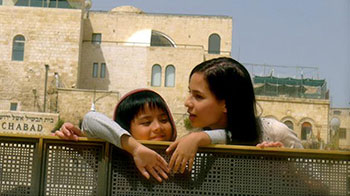
It’s 2009 in Tel Aviv, and the playgrounds in certain areas of the city are empty. The parents of these children do not allow the children to go out and play, for fear they will be deported. The children have become prisoners in their own homes.
Every day, the Israeli government deports the children of migrant workers because of new criteria that restrict living in Israel to those with native parents. Transit, a drama directed by Hannah Espia, focuses on the journey of one family as they grapple with the new legal reality.
The story of what it means to always be other and never be truly at home is the story that Transit tells. The same few days unfold from the perspective of the four Filipino protagonists: Janet (Irma Adlawan), Tina (Mercedes Cabral), Yael (Jasmine Curtis), and Joshua (Marc Justine Alvarez). Each of these characters are asking what it means to always be moving, running, from one country to the next, from one temporary dwelling to another, ever uncertain of what the next day will bring.
Joshua, the four year old child of Moises (Ping Medina), lives in a blissful world in which the port of Jaffa beach is his playground. Joshua’s aunt Janet, however, lives in constant fear of his deportation. He obligingly wears a scarf to disguise himself from the authorities. “Better to hide here than starve there,” is the conclusion of both Janet and Moises. They prefer to run and hide in order to make higher wages in Israel than in the Philippines.
Their running and hiding is encapsulated in a metaphor about the moon and sun that Janet and Moises take turns telling to Joshua. According to the story, the sun and the moon used to be together, but then one day they grew apart, and now, the moon always hides from the sun, while the sun chases the moon. The viewer hears the audio of these stories while watching the insides of buses in Israel, as the characters move from one location to another.
Just as the characters run from the authorities, they grow increasingly distant from each other. As Janet hides Joshua, her daughter, Yael, whose father is Israeli, increasingly embraces her Israeli identity and shuns her Filipino one. She and her Israeli boyfriend live an Israeli life, care free of worries. Janet grows increasingly enraged about Yael’s distance, as she hides her Filipino side.
The four-year-old Joshua is unaware of the dynamics of distance. He loves Israel: the land, the people, the language. He attends a Bar Mitzvah and asks to have his own one day. He learns Torah from Eliav, the older man his father takes care of. He speaks the language fluently.
The structure of the film, repeating the same narrative from different perspectives, is not completely effective. While the structure asks the viewer to get into the minds of each of the characters, the film often feels repetitive. The separate stories don’t come together effectively at the end. Some of the threads are lost, while others don’t connect to the overall themes. While the subject matter is crucial to address and fascinating, it is not told in the most cohesive fashion. Certain scenes, however, stand out for their beauty. Joshua’s eyes glow as he experiences a Bar Mitzvah at the kotel or plays in the sand at the beach, an outsider who has come to love Israel as his own home. Yael’s teenage angst as an Israeli whose mother is not fully integrated into the society is well portrayed visually in shots of her lying on the ground and gazing pensively upward. The moments of great delight for these characters in Israel, like Joshua’s overwhelming joy as he blows out his birthday candles, are overshadowed by the increasing fear of deportation. Birthdays are occasions for celebration and also for fear, as they mark age. Just because Joshua turns five (one of the criteria laid out that exempts children from deportation), does not mean he is safe. The film highlights well the temporary nature of moments without worry.
A 2013 Cinemalaya Film Festival Best Film under the New Breed category, Transit is a window into a world where the sun and moon continue to spin and never find each other. Always searching for a home, Transit sheds light on every person’s desire for a place to call their own. Yet because of its narrative flaws, the movie itself never quite hits home, and without tying up all the loose ends, the viewer feels in transit.
Yael Roberts is a recent graduate of Stern College now learning at the Pardes Institute in Jerusalem.
